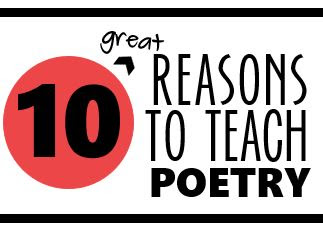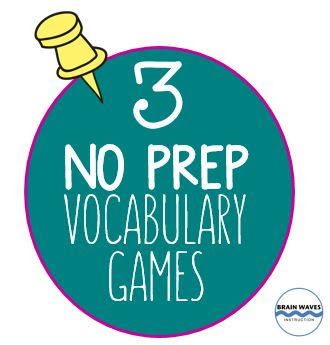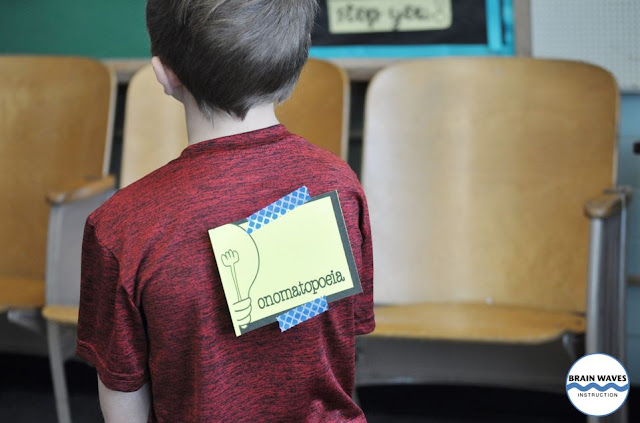As you may know, April is National Poetry Month, and as good
a time as any for some reminders on why it’s so important to teach poetry. Too often, poetry instruction is seen as
frivolous, or worse, dull, when really, the exact opposite is true.
Need proof? Check out these 10 reasons to teach poetry…
1. It can connect with larger instructional themes. Poems can
beautifully complement themes of every topic – from aging to rebirth. A poem
can help you take a different angle on a complex historical period, like the
Civil Rights Movement, and make it more personal. For instance, you could easily link poetry to Black History Month with a Poet and Poem study on Langston Hughes or Maya Angelou.
 2. It can be a means of teaching some literacy rules. By showing students what happens when poets break or pervert the rules – e.e. cumming’s lack of capitalization comes to mind – they can form a better understanding of what purpose those rules serve in communicating clearly. Students can investigate how and why traditional grammar and spelling conventions were ignored by analyzing poems like "In just." Of course, in order to do so, they'll need to know the literacy rules, first ;).
2. It can be a means of teaching some literacy rules. By showing students what happens when poets break or pervert the rules – e.e. cumming’s lack of capitalization comes to mind – they can form a better understanding of what purpose those rules serve in communicating clearly. Students can investigate how and why traditional grammar and spelling conventions were ignored by analyzing poems like "In just." Of course, in order to do so, they'll need to know the literacy rules, first ;).4. It can be quick to teach. Poetry can be done in relatively little time. You don’t need to dedicate a whole unit to poetry. Try a poem a day (poets.org offers some great resources https://www.poets.org/poetsorg/poem-day), or just once a week. There are tons of great poems in literary magazines like Cricket. And song or rap lyrics work, too. Or, bring out a poetry lesson on a holiday. Free lessons like this Limerick Writing Lesson are always a hit with students!
5. It can explain. In this mixed-up, crazy world, a lot of bad things
happen. Heck, just opening the newspaper (or its online equivalent) can be a
scary prospect. Poems about tough stuff – mortality, race, aging, politics, war
– can provide a softer, more human context than your average news story.
6. It can confuse. Not all poetry is meant to be understood. Don’t
worry about analyzing every poem you present to the class. Some poems are
simply meant to be heard, read and felt. You can find my favorite poems to read aloud to students by downloading the FREE lesson and handout that goes along with a video about how to teach poetry analysis.
7. It’s an acceptable way for students to express emotion. Students may be too self-conscious, or lack the vocabulary to convey what they’re feeling about themselves and the world. A poem read aloud, or recited by students, gives them the words they need to start a conversation. Or maybe it is the conversation. These journey poems are perfect for adolescents.
8. It improves reading and writing of all kinds. Poetry, which begs to
be read more than once, gives students the chance to practice close reading
strategies, as they analyze the structure, word choice and even the shape of
the words before them. With its generally concise format, poetry can help you
teach skills necessary in other forms of writing, like using precise words and
imagery. One of my favorite ways to just that, is with interactive poetry flip books. They help students closely read and analyze poems in engaging and approachable ways!
9. It’s relatable. For every student who feels no one else could
possibly understand what he’s going through, there’s a poem by or about someone
in the same place. When read in class, a student might see that others around
him are connecting to it, too.
10. It’s a chance to practice speaking and listening skills. With so
much emphasis on reading and writing, students don’t always get explicit
instruction on how to annunciate, project and listen closely. There's nothing better than a class full of students who want to read and share poetry that they've written. Encourage speaking and listening skills by hosting a Poetry Reading after students finish a poetry writing unit. It's easy! Just have students select one poem to share. Give them lots of opportunities to practice reading their poems. Then, find a space like the library and auditorium for the event. Finally, send out invitations. That's it!
If you're ready to infuse your classroom with fun poetry lessons and ideas, then you might want to sign up for my series of FREE poetry lessons. You'll receive a bunch of free poetry tips and lessons right in your email inbox! Oh, and you'll get an exclusive freebie for "Nothing Gold Can Stay," right away!
Thanks so much for stopping by!
Mary Beth





























